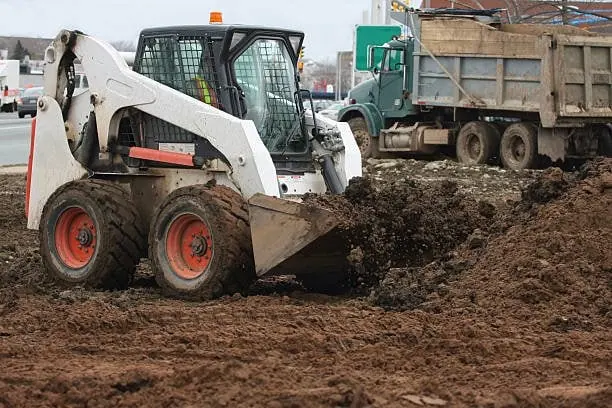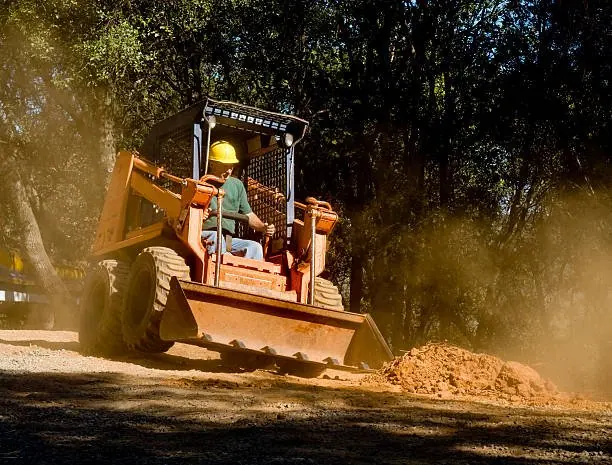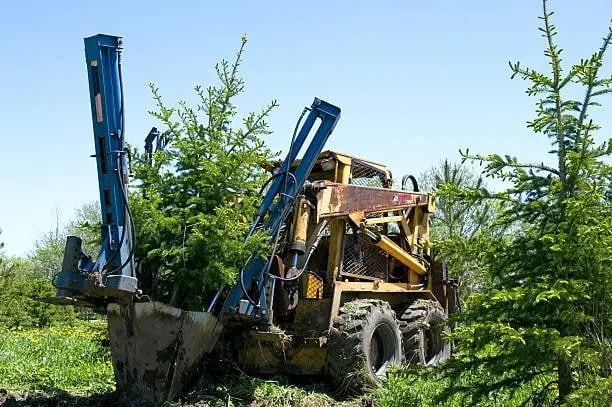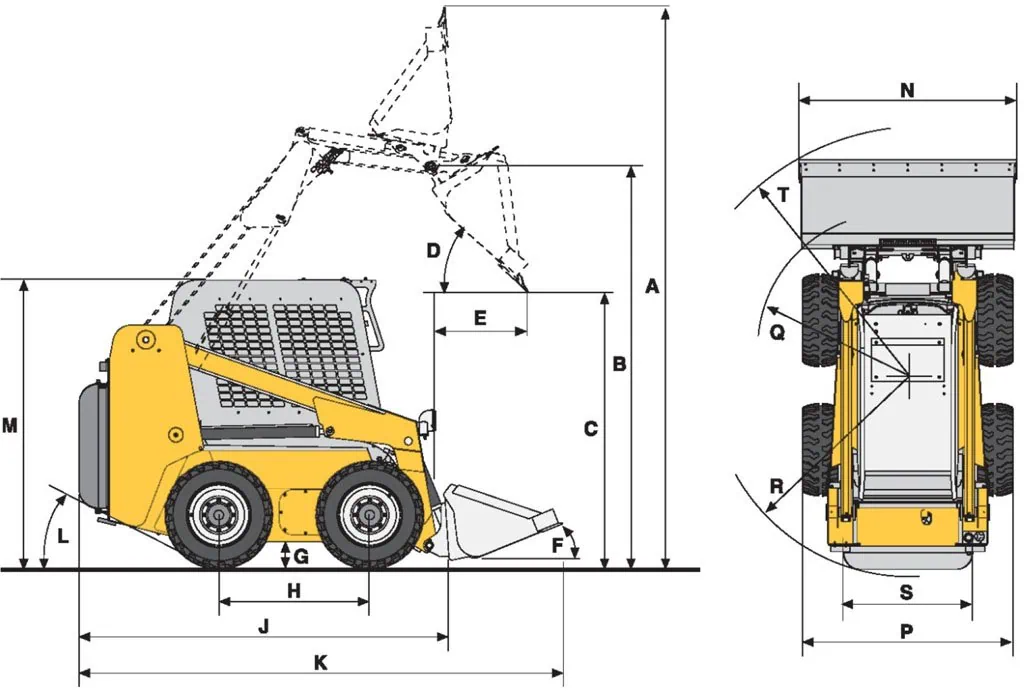In the world of construction, agriculture, and landscaping, the right machinery is key to enhancing productivity, ensuring safety, and completing projects with maximum efficiency.
When considering the best option for your worksite, skid steer vs front loader often emerges as the ultimate debate. Both machines are popular choices and are widely used across various industries, but each has unique strengths that cater to different needs. In this article, we will explore the advantages, limitations, and ideal use cases of both, helping you determine which one best fits your project requirements.
This skid steer vs front loader showdown will cover maneuverability, power, versatility, cost, and more, so that by the end, you’ll have a clear understanding of which equipment will enhance your worksite’s productivity.
Table of Contents
ToggleWhat Are Skid Steers and Front Loaders?
To begin the skid steer vs front loader comparison, let’s first take a closer look at the basic mechanics of each machine.
A skid steer is a compact, agile loader that is renowned for its ability to maneuver in tight spaces. It features a unique wheel system where each pair of wheels operates independently, allowing the machine to pivot on the spot and make tight turns. This feature gives the skid steer exceptional maneuverability, which is ideal for small workspaces or congested job sites. It is often used for lighter tasks like digging, grading, and material handling, and its versatility extends with a variety of attachments like forks, buckets, augers, and even snowplows.
On the other hand, a front loader is typically larger, designed for heavier material handling. Its front-mounted bucket can lift and transport large quantities of material like dirt, gravel, or snow. The front loader is a popular choice for construction and farming applications where heavy-duty lifting and scooping are required. While it is larger and less nimble than a skid steer, its power and lifting capacity make it an essential piece of equipment for large-scale tasks.

1. Maneuverability: Skid Steer’s Tight Advantage
When it comes to maneuverability, the skid steer vs front loader debate heavily favors the skid steer. Its independent wheel system allows for precise, 360-degree turning. This makes it highly agile and ideal for confined spaces where turning and tight navigation are essential. Whether you’re working in narrow pathways, a cluttered construction site, or a compact landscaping area, the skid steer can easily maneuver without the need for much space.
In contrast, the front loader is significantly larger and requires more space to maneuver. It cannot pivot in place like the skid steer and has a much broader turning radius. If you’re working in open areas, the front loader performs well, but it struggles in spaces that require tight turns or quick repositioning.
The skid steer vs front loader competition in terms of maneuverability clearly highlights the skid steer’s dominance in smaller spaces and more intricate tasks.
2. Power and Lifting Capacity: Front Loader’s Heavy Duty Strength
When comparing the skid steer vs front loader in terms of power and lifting capacity, the front loader typically takes the lead. Front loaders are designed for heavy lifting and can handle several tons of material at once. With a larger bucket and powerful hydraulic system, they are ideal for large-scale tasks like loading trucks, clearing rubble, or lifting heavy construction materials.
On the other hand, the skid steer is much smaller and is designed for lighter, more agile tasks. It has a lower lifting capacity than the front loader and is not built to carry the heavy loads that the front loader can manage. A skid steer is better suited to moving lighter materials, like sand, mulch, or smaller aggregates, but when it comes to hauling larger amounts of dirt or gravel, the front loader is the superior choice.
In terms of lifting power, the front loader is clearly the winner, while the skid steer excels in more delicate, lighter tasks.

3. Versatility: Skid Steer’s Ability to Adapt
When comparing skid steer vs front loader for versatility, the skid steer shines. One of the key advantages of a skid steer is its ability to quickly switch between a wide range of attachments. Whether you need a bucket for scooping, forks for lifting, or a snowplow for winter clearing, the skid steer can handle it all. This makes it incredibly versatile, enabling operators to perform different tasks on the same job site.
While front loaders can also be equipped with a variety of attachments, they are generally more limited in terms of adaptability. A front loader’s primary function is lifting and transporting materials, so although it can be fitted with different buckets or forks, it’s not as flexible as the skid steer when it comes to non-material handling tasks. If you need a machine that can handle a wide variety of tasks, the skid steer is the better choice.
In the skid steer vs front loader debate for versatility, the skid steer emerges as the more adaptable, multipurpose option.
4. Stability and Comfort: Front Loader’s Heavy-Duty Design
When comparing the skid steer vs front loader in terms of stability, the front loader is generally the more stable machine. Designed to handle heavy lifting, front loaders feature a robust frame and larger tires or tracks, which provide better stability when carrying large loads. This makes them ideal for heavy-duty tasks, where lifting large quantities of material without tipping is a concern.
The skid steer, while stable for its size, can sometimes be less stable than the front loader. Its smaller size and compact design can make it more prone to tipping, particularly when lifting heavy or off-center loads. However, modern skid steers are equipped with safety features like counterbalance systems and low centers of gravity to improve stability during operation.
In terms of stability during heavy lifting tasks, the front loader is the better choice. However, for lighter, more agile operations, the skid steer still holds its own.

5. Speed and Efficiency: Skid Steer for Quick Jobs
When it comes to speed and efficiency, the skid steer vs front loader comparison leans toward the skid steer for smaller, quicker tasks. Due to its compact design and high maneuverability, the skid steer can move quickly from one task to another. Whether you’re digging, grading, or scooping, the skid steer can get the job done efficiently in a short amount of time.
However, for larger-scale jobs that require moving large quantities of material across an open area, the front loader is far more efficient. Its larger bucket and powerful engine allow it to move and lift large amounts of material quickly, making it perfect for tasks that require high volume and heavy lifting.
In the skid steer vs front loader debate for speed and efficiency, the skid steer is faster for small-scale tasks, but the front loader excels for large, heavy-duty jobs.
6. Operating Costs and Fuel Efficiency: Skid Steer’s Advantage
When considering the skid steer vs front loader from an operating cost perspective, the skid steer generally comes out on top. Due to its smaller size and more efficient design, a skid steer consumes less fuel and typically incurs lower maintenance costs. This makes it a more cost-effective option for small businesses or contractors working on tight budgets.
In contrast, front loaders, due to their larger engines and more complex design, have higher fuel consumption and maintenance costs. Although front loaders are powerful and efficient at large-scale jobs, their operational expenses can quickly add up, especially with long hours or heavy use.
For those concerned about operating costs, the skid steer offers better fuel efficiency and lower overall expenses, making it a more affordable option in the long run.
7. Durability and Maintenance: Front Loader’s Robust Build
When comparing the skid steer vs front loader in terms of durability and maintenance, the front loader is generally built to last longer under harsh conditions. Its heavy-duty design, made to withstand tough environments, means that it requires fewer repairs if maintained properly. The front loader is a long-term investment that is ideal for large-scale, heavy-duty operations.
The skid steer, while durable for its size, may require more frequent maintenance, especially if it’s used for tasks beyond its intended weight capacity. However, with proper care, a skid steer can still offer years of service. The smaller size and lighter design of a skid steer mean that it may experience more wear and tear compared to the front loader.
For larger, more demanding jobs, the front loader is built to endure. But if you’re working with smaller, more versatile tasks, the skid steer is a great option that balances durability with ease of use.

8. Conclusion: Choosing Between Skid Steer vs Front Loader
The decision between a skid steer vs front loader ultimately depends on the type of tasks you need to perform. If you’re working in confined spaces, need maneuverability, and require a versatile machine for a variety of jobs, the skid steer is your best bet. It offers excellent agility, adaptability, and cost-effectiveness for smaller projects.
Ultimately, the decision between a skid steer vs front loader depends on your specific needs, the scale of your operations, and your budget. By understanding the strengths and limitations of each machine, you can choose the right equipment that will maximize your productivity and efficiency on the job site.If you have any questions, feel free to contact us.
